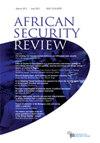Rethinking community security in Uganda: integrating community policing with intelligence-led policing
IF 1.1
Q3 INTERNATIONAL RELATIONS
引用次数: 0
Abstract
ABSTRACT Contemporary changes in crime reveal the need to enhance law enforcement methods such as Community Policing with intelligence-based approaches for sustained community–police partnerships and improved community participation in ensuring safety. Community participation and partnership with law enforcers is essential for identification of threats and vulnerabilities, collection, analysis and sharing of crime data and problem solving. Uganda’s Community Policing has since 1989 focused on image construction, trust and confidence building for the police within the community and underscoring police relevancy in a transitional democracy while crime remained steadily high. The introduction of crime preventers and Local Defence Units (LDUs) to back-up police in handling crime, patrol neighbourhoods and gather intelligence has instead attracted accusations against law enforcers for excessive use of force, human rights violations and involvement in crime. Intelligence led policing (ILP) aims at enhancing community safety based on analysed information for strategic, operational and tactical benefits in crime prevention. Using secondary sources of data, the paper argues that while Community Policing has been preferred in crime prevention, intelligence gathering for purposes of investigating and preventing crime has remained poor. It recommended that Community Policing is integrated with ILP for effective detection, prevention, management of crime and enhanced community security.重新思考乌干达的社区安全:将社区警务与情报主导的警务相结合
本文章由计算机程序翻译,如有差异,请以英文原文为准。
求助全文
约1分钟内获得全文
求助全文

 求助内容:
求助内容: 应助结果提醒方式:
应助结果提醒方式:


